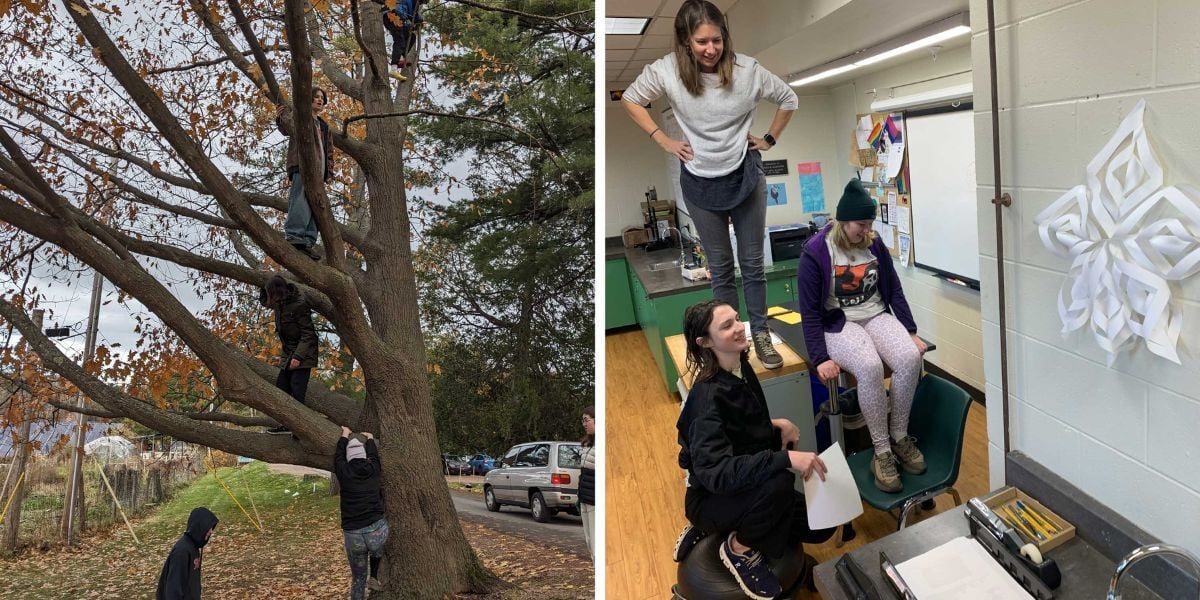How Friction Fosters Connection and Builds Community
In an age where “frictionless” conveniences like instant deliveries and AI interactions promise to make life smoother and easier, a lesser-known cost...

 If you’ve been paying attention to the educational landscape in the past few years, you’ve probably heard the terms “Social and Emotional Learning,” “Grit,” “Resilience,” “Life Skills,” or “Soft Skills” being thrown around. While it is clear that these skills are extremely important to our young people and can be a large factor in determining success, it can be difficult to sort out which specific skills fall into these categories and how to teach them. At Rock Point School, we refer to teaching these skills as educating the “whole person.”
If you’ve been paying attention to the educational landscape in the past few years, you’ve probably heard the terms “Social and Emotional Learning,” “Grit,” “Resilience,” “Life Skills,” or “Soft Skills” being thrown around. While it is clear that these skills are extremely important to our young people and can be a large factor in determining success, it can be difficult to sort out which specific skills fall into these categories and how to teach them. At Rock Point School, we refer to teaching these skills as educating the “whole person.”
The term “grit” became popular with Angela Duckworth’s book Grit: The Power of Passion & Perseverance (here's her TED talk) and it has come to mean effort and interest over natural ability. This focus of stressing the importance of working hard is important with young people because it allows them to recover from mistakes, see the value in practicing, and enjoy the “growth mindset.” It’s also significant because ANYONE can work hard, not just the gifted and talented.
Here is a common story we see that illustrates why grit can be so important: a student is naturally gifted and intelligent. Perhaps in elementary school the school work was easy for them and they did not have to focus very much to succeed. Adults praised them frequently for their intelligence and abilities. As they got older and school work got harder, they began to struggle because they had not yet developed the skills they needed (time management, good work habits, study skills, organization). Instead of rising to the challenge, they became frustrated, anxious, or depressed and, eventually lost their motivation to engage in school. Does that story sound familiar?
With learning focused on “grit,” students are more prepared to work through challenging expectations. They expect to work hard and they build a “tool kit” to get them through challenges and mistakes. Part of the concept of “grit,” as outlined in Duckworth’s book, is about tapping into students’ natural interests and passions. When students are allowed to fully explore their passions, they are more motivated and engaged in learning.
Soft skills are often discussed as the “unquantifiable” skills employers look for when hiring. Good communication skills, the ability to work well in a team, adaptability, problem solving, and the ability to make critical observations/analysis are all examples of “soft skills” that can be taught in schools.
One place where students practice many of these skills at our school is in the art room. To practice communication skills, students must communicate their ideas to the teacher clearly enough to get the supplies they need. Frequently students work together on a project, such as this foliage installation or the Fairy House. As with any project, they have to improvise when their artistic vision does not go as planned and, finally, they need to assess how to improve their process for the next project.
As you can see, these skills can be built into almost any class and can really help students be successful in a work environment.
When we think of “life skills” we think of things that are often not taught in schools anymore. Financial literacy, cooking, and cleaning are just a few of the concrete examples of these “life skills,” but it can also refer to less tangible skills like the soft skills mentioned above. As the most general of the terms we are exploring, “life skills” can mean any skill that is necessary for a full, productive life. Life skills can encompass everything from organizing your desk to doing laundry to having a solid handshake.
One advantage of a small boarding school experience is that some life skills are naturally part of the student experience. Boarding school students learn how to live together and work through their conflicts, something that serves them well as they go off to college or in any work environment. At our school, they also learn how to do their own laundry, clean a bathroom, and prioritize spending.
While “soft skills” and “life skills” are terms that may be used by employers or universities to describe a wide range of important learning, “social emotional learning” is the term that is most widely used in educational research. Social and Emotional skills are being incorporated into many state standards, which is a wonderful thing for our students and teachers.
Social and Emotional skills are defined as the tools necessary to understand and manage emotions, feel and demonstrate empathy for others, set and reach positive goals, create and maintain positive relationships, and make responsible decisions. Recent research has demonstrated that learning interventions addressing these skills can increase academic performance, pro-social behaviors, and decrease aggression and distress in students.
This just makes good sense. Students who learn how to regulate their emotions, positively interact with peers and adults, and make good decisions are able to spend more time learning and less time “getting in trouble” or being distracted. When students have positive interactions and relationships at school they are more motivated and engaged.
One example of a way to teach some of these skills is through mindfulness practices such as yoga, meditation, or deep breathing. Teaching students something as simple as to slow down and take ten deep breaths if they begin to feel overwhelmed begins to create those habits which help them self-regulate.
As you can see, there are many overlapping concepts in these terms. No matter what you call it, the research is pointing to the importance of educating the “whole child.” Emotional, social, practical, and academic skills need to be taught and nurtured at school to help our young people be successful through the rest of their lives.

In an age where “frictionless” conveniences like instant deliveries and AI interactions promise to make life smoother and easier, a lesser-known cost...

As we are heading into our vacation, I am thinking about a student at Rock Point from many years ago who really struggled to get back into the school...

Every quarter, students choose from several electives, which meet three times a week to supplement the curriculum and provide a fun way to start...